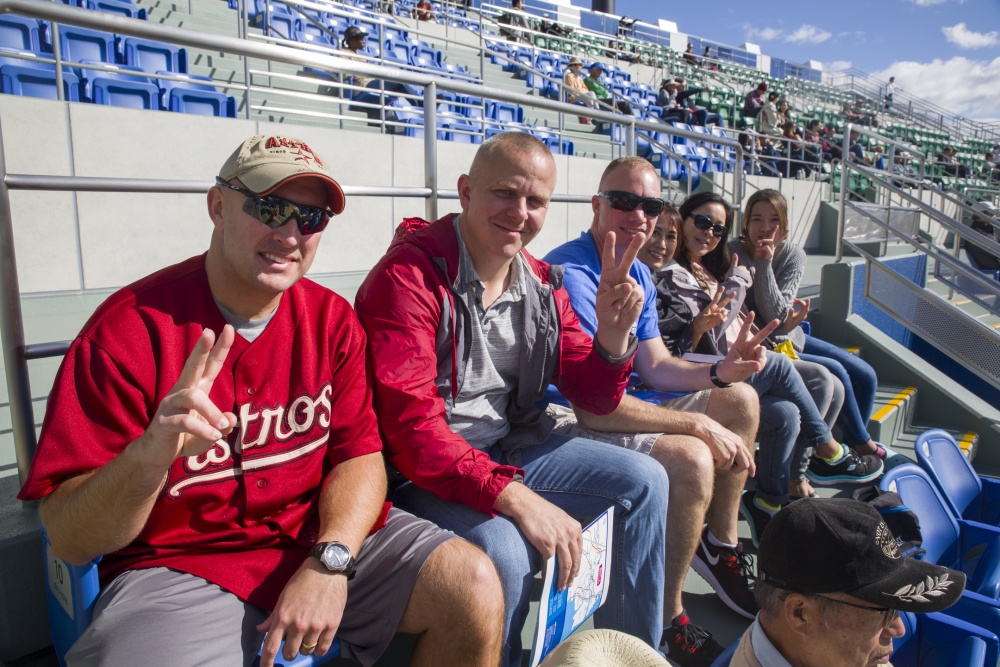Kizuna stadium brings American, Japanese locals together
By DVIDS, November 4

After nearly a decade of joint planning and execution between Iwakuni City and Marine Corps Air Station Iwakuni, the Atago Hills sports complex, Kizuna stadium, was finally given its grand opening before a crowd of hundreds of local Japanese and American visitors in Iwakuni City, Japan, Nov. 4, 2017.
The grand opening was celebrated with speeches of pride and gratitude by MCAS Iwakuni and Iwakuni City officials, a ribbon-cutting ceremony and was highlighted by a friendly baseball game between American and Japanese high school students. Distinguished guests such as U.S. Marine Corps Col. Richard F. Fuerst, commanding officer of MCAS Iwakuni, and Yoshihiko Fukuda, mayor of Iwakuni City, who co-hosted the event together, also partook in the planting of dogwood trees, which are meant to be living symbols of the U.S.-Japan friendship.
“It’s an important day for Iwakuni City and MCAS Iwakuni,” said Fuerst. “A venue like this will help us conduct a lot of fun events and continue to grow the relationship we have with the people of Iwakuni and Yamaguchi prefecture. They have accepted the Marine Corps here so it’s important for the citizens to feel like they’re a part of the air station. They support us, and we support them as well. We want to be good neighbors. A facility like this is co-shared; it’s open to the citizens of Iwakuni and the air station so we can come together and enjoy ourselves.”
The stadium is seen as more than just a sports complex for teams to train and play in. It is a hallmark of what the U.S.-Japan friendship has accomplished in Iwakuni City. Everything from the dogwood trees planted just outside to the name of the stadium itself – Kizuna, which means bond – represents the prosperous union between two allies. The dogwood trees are part of a larger project held countrywide throughout Japan. Over one hundred years ago the people of Japan donated cherry trees that are now planted in Washington D.C. Four years ago a project was created to donate 3,000 dogwood trees from the people of the United States to the people of Japan.
Joy M. Sakurai, the principal officer at the U.S. Consulate in Fukuoka and one of the leaders of the project, was invited by Fuerst and Fukuda to give remarks about the project and receive a commemorative item as the guest of honor. The stadium gave her the opportunity to continue her project in a city filled with Japanese citizens and American service members.
“Finding a place for 3,000 dogwood trees was challenging so we decided to divide the trees and plant them in places that were very important to us,” said Sakurai. “I was at the U.S. embassy of Tokyo at the time handling the project, and Iwakuni came up as a definite place we wanted to put these symbols of the U.S.-Japan friendship. So we had 50 trees planted here in Iwakuni, and dedicated some of those 50 original trees to be planted around the stadium as further living symbols of the friendship between our countries.”
Sakurai also received the honor of throwing the first pitch before the players took the field. American students from U.S. military installations in Japan such as Yokota, Zama, Sasebo and MCAS Iwakuni came together for the first time to form the “West” team. They played against a collection of Japanese high school students called the “East.”
The game ended with the East beating West, and then a second game was held where the two teams mixed so the American and Japanese athletes could play together.
“This is an awesome experience for our kids and for the community,” said Steven Fench, the assistant coach of the West. “It’s fantastic playing against a team of such high caliber. They’re a well-disciplined, very fundamental team. A lot of times we’re always competing against each other during the regular season, but when we get together it’s a big family atmosphere.”
The stadium can seat a maximum capacity of 8,000 people and has two softball fields along with the main baseball field. Sakurai said she hopes to see the venue used in the future as a training ground for some of the U.S. Olympic teams who will come for the 2020 Olympics, as well as professional baseball teams, such as the Hiroshima Carps.
“I think it is very much a world-class stadium for amateurs and perhaps even professionals to come together,” said Sakurai. “We hope that it will be a great way for Americans and Japanese to work together, whether it is junior high school students up to adult leagues. It elevates the city’s position in becoming either an actual venue for games, or for practice grounds, and it’s a great place to have sport exchanges and share our cultures.”
Kizuna stadium has the potential to be a cornerstone for sports in Iwakuni City and for local American-Japanese comradery, while celebrating the hard work and effort shared by local citizens and their guests from across the Pacific to making this decade-long project a reality. “The people of Iwakuni have always been very welcoming of the U.S. military and this is a great way to symbolize all of that close friendship,” said Sakurai. “Sports, as we all know, are a very universal factor. You don’t have to speak each other’s language to get along and play really well together as long as you understand the general rules. This is a great way for hundreds, if not thousands, of people to come together from across different cultures.”



